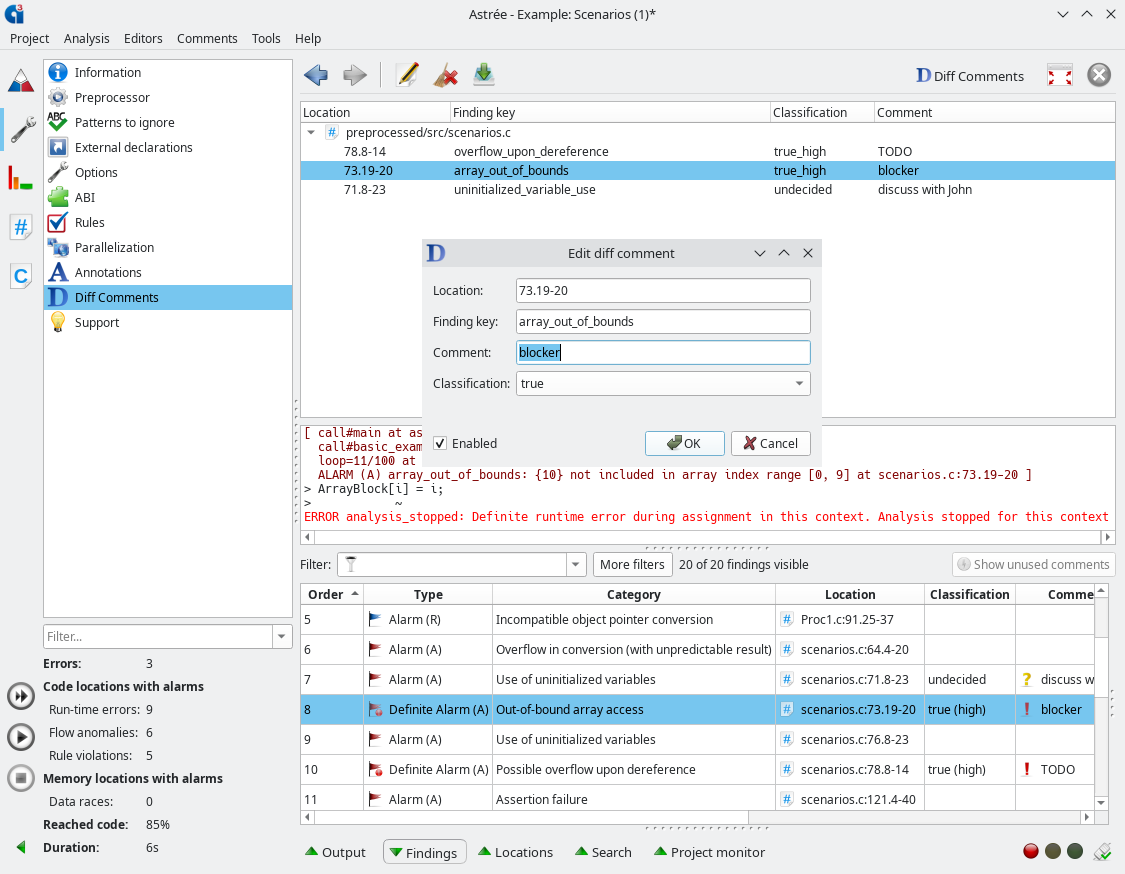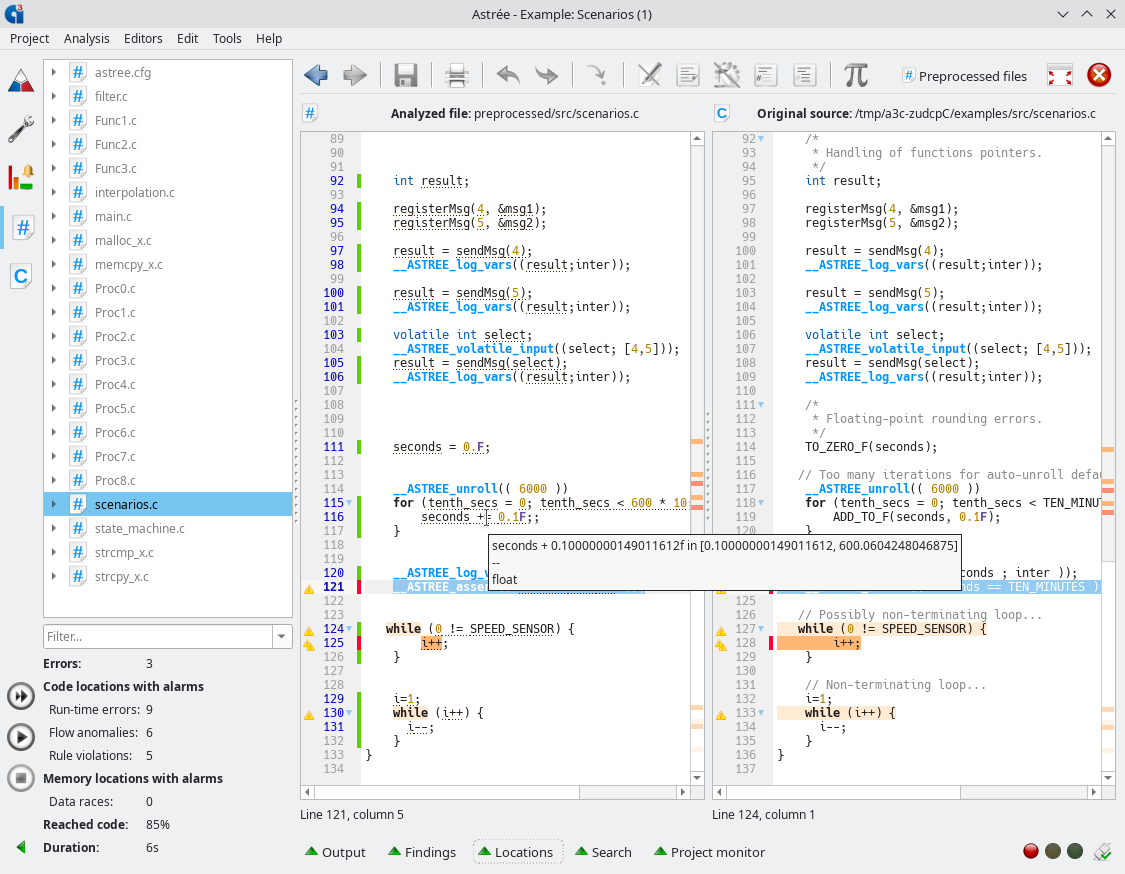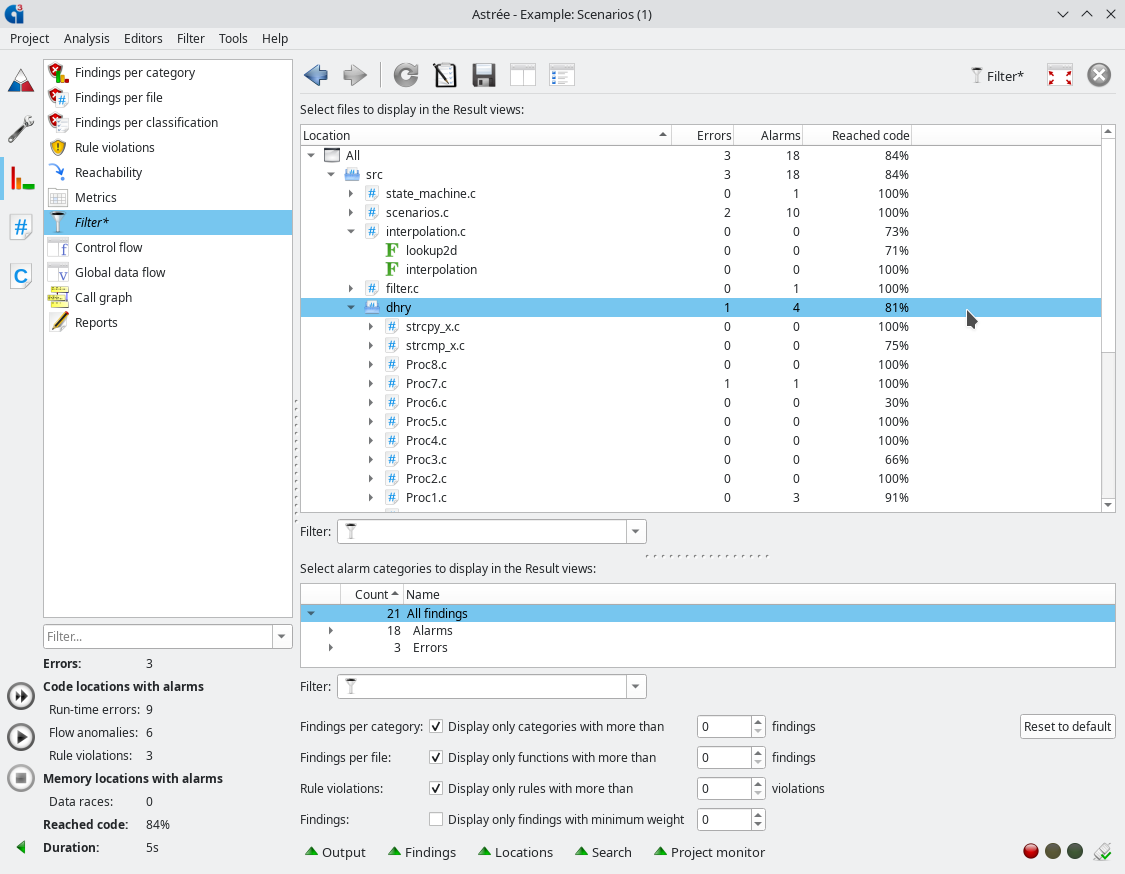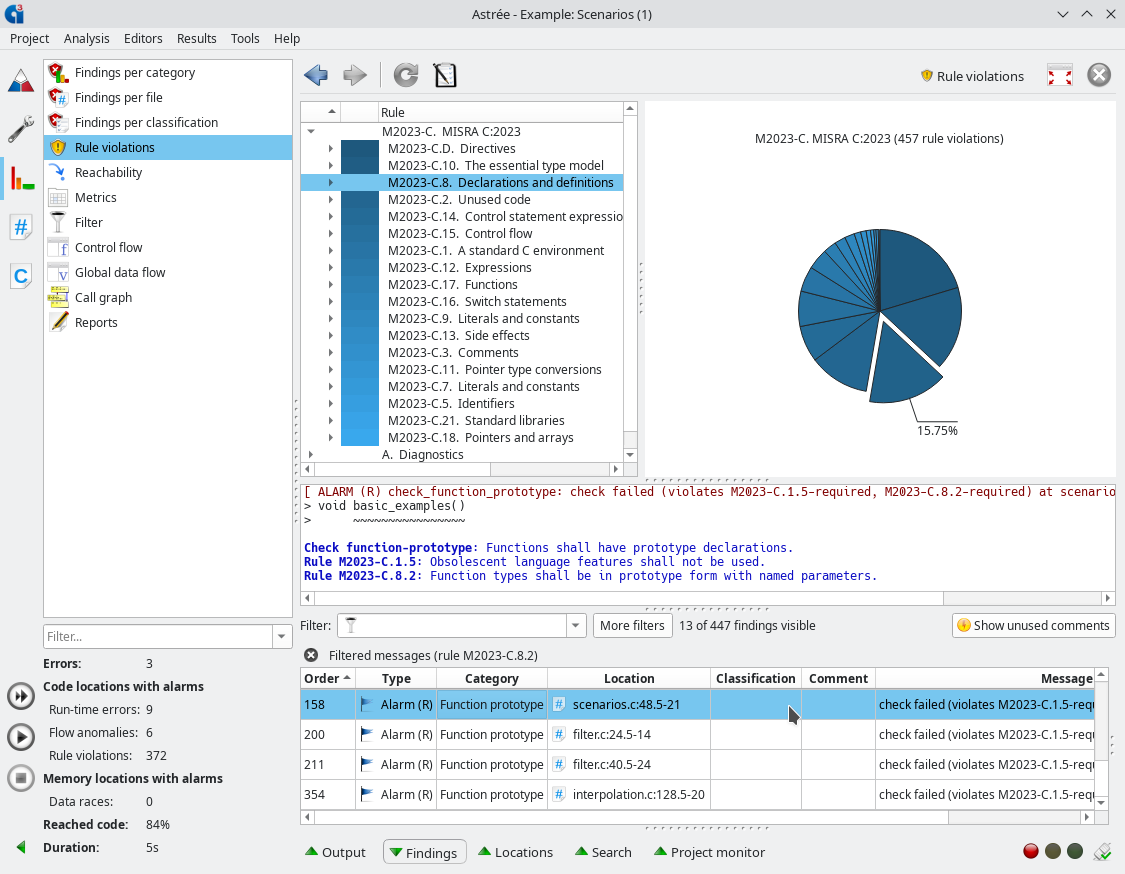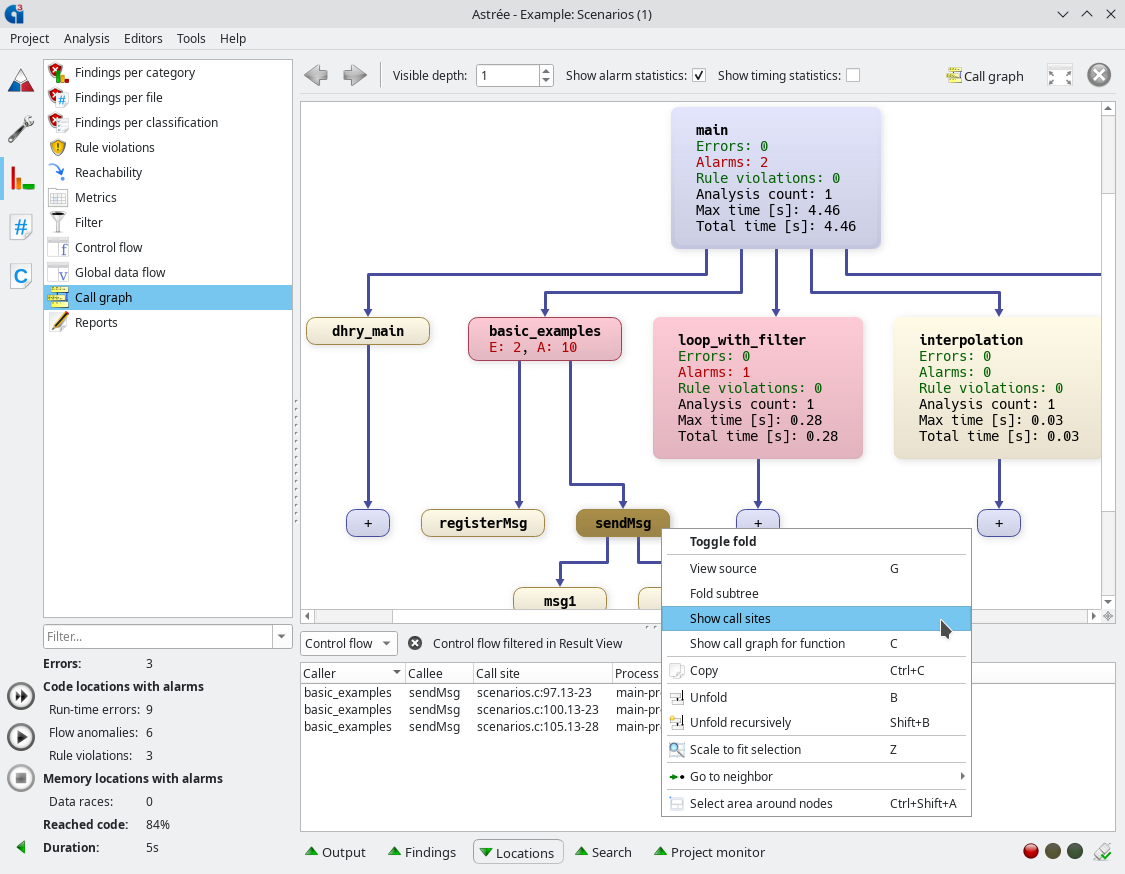AbsInt License Manager (ALM)
All network connections between the ALM server and its clients are now TLS-encrypted, and the ALM web interface is now served via HTTPS in addition to HTTP.
Upgrading your client to this release requires upgrading your ALM as well. Old client versions will continue to work with the new ALM using the non-encrypted legacy protocol, unless you block the corresponding port in your firewall. The default port for the legacy protocol is 42424, while for the new TLS connection it’s 42426.
A new environment variable AI_LICENSE_TLS is used to configure
the license, while old versions use AI_LICENSE. This enables you
to set up old and new versions to run in parallel, for example:
AI_LICENSE = alm-server@42424 AI_LICENSE_TLS = alm-server@42426
The default port for the ALM web interface is 42425 for HTTP and 42427 for HTTPS.
alauncher
- The tool launcher now supports scanning for installed products in arbitrary directories
specified via the option
--dir <path> - The launcher will now auto-discover all a³ tools located in sibling
a3*directories. This enables you to unpack the product ZIP files in a directory and use the launcher of any of them to access all of them. For example, if you have a directory witha3_c_123,a3_c_456, anda3_ppc_789, you can now use the launcher ina3_c_456/binto access all three tools.
DAX changes
- Removed support for the deprecated DAX preprocessor tags
<strip-path/>and<replacements/>. They are no longer needed and can be removed from DAX files. - Removed the deprecated DAX option
use-relative-paths.
Improved precision

Analysis precision has been improved for:
- computations that involve bit masks
- dynamic memory allocations from within C++ virtual methods
- modulo operations in the congruence intervals domain
- casts from float to integer in comparisons
- structs assigned to self
- the octagon domain when adding positive values, and on expressions that involve casts
Improved C++ mode
- Improved tooltips.
- Integer types in alarms messages and tooltips are now displayed as
(un)signed
wherex-bit integerxis the number of bits used to represent the type. - Regular expressions provided as arguments to the options
unroll-loops-in-functionsandseparate-functionnow match entire function signatures instead of a prefix of function signatures. - Statements that are inserted via the original source annotation mechanism are now taken into account when computing the analysis coverage information.
- Fixed integer signedness assumed by the C++ frontend for fields of union and struct types
in the presence of inheritance. This generally improves analysis precision and corrects alarms
in Astrée directives that specify bounds for the affected fields
(
__ASTREE_modify,__ASTREE_volatile_input,__ASTREE_known_range,__ASTREE_global_assert).
Diff-based comments
Introducing a new diff-based comment mechanism which, in case of code changes,
identifies commented code locations by comparing the currently analyzed code
with a reference from a previous analysis run. The new comment mechanism
is available in all analysis modes
(astree, astree-cxx, rulechecker).
- Existing comments that use the comment modes AAL or pattern
can be converted to the new comment mode by using a button
in the toolbar of the diff comments view or the command line option
--convert-to-diff-comments. - The command line option
--export-diff-comments <dax-file>allows exporting diff-based comments into a DAX file.
Other improvements
- The tooltips for displaying value ranges have been extended to all sub-expressions.
For example, in an expression like
x + yAstrée now also shows a tooltip for the+operator, reporting the result of the addition. - Improved reporting of ABI settings that are incompatible with the Clang frontend.
- The JSON compilation database importer now resolves relative paths relative to the location of the provided JSON file instead of relative to the current working directory.
- The state machine domain is now enabled by default.
- The symbolic domain now handles:
- relations that involve shifts, e.g.
x = in >> 15; out = (in << 1) - (x << 16); // 'out' is now known to be positive for positive 'in'
- complex expression that are bounded by comparisons, e.g.
((a - b - c) / d) < 8;
- relations that involve shifts, e.g.
- Improved the octagon packing heuristics to create more useful octagon packs on some code patterns.
- Astrée now accepts union expressions in struct and array initializers.
- The calculation of malloc contexts has new limits to ensure that it does not take too long.
- Removed false alarms when using value-initialized iterators with the preprocessor option "Use abstract stubs for the C++ standard template library" enabled.
- Improved the error reporting for partitioning directives. The analyzer now avoids reporting alarms that occur in the evaluation of the directive but reports more consistently when such directives are ignored completely.
- Dynamically allocated memory blocks are now displayed in the global data flow view and marked as possibly shared or affected by data races when being accessed from multiple processes.
- Improved performance when analyzing assignments from large smashed to non-smashed variables.
- The automatic loop unroll heuristics now ignore Astrée directives when counting the number of statements in a loop. Introducing directives into loops therefore no longer influences loop unrolling decisions with respect to the option auto-unroll-size.
- Accesses from multiple processes to the same global variable are no longer reported as shared if the accesses do not happen in the same phase.
- Replaced the ABI option
unaligned_dereferenceby two new Astrée semantics options:warn-on-misaligned-dereference(default:yes) warns about misaligned dereferencescut-misaligned-dereference(default:yes) cuts traces with misaligned dereferences from the analysis
The defaults for the new options correspond to the default of the former
option
unaligned_dereference=error.
__ASTREE_global_assert can now express
that a pointer may only point to certain offsets in a variable.
For example, if the pointer p may point to the fields
a or b of variable v,
that can be expressed as
__ASTREE_global_assert((p; {&v.a, &v.b}));Fixes
- Fixed the directive
__ASTREE_check_separate_targetsfor the case that more than two arguments are given. - Fixed an issue that could cause crashes when using
__ASTREE_octagon_packwith variables of pointer type and the Boolean domain enabled. - Fixed an issue that could cause the analyzer to crash
when the option
generate-undeclared-absolute-addresseswas enabled.
Toolbox for TargetLink

- Fixed an issue that caused the toolbox to fail when supplying an additional DAX file via the toolbox preferences.
- Improved file handling to prevent configuration errors when the same file name is found multiple times with different capitalization.
- The generated preprocessor configuration now sets the
combine="merge"attribute. This allows specifying additional includes and defines for the generated preprocessor configuration via an additional DAX file, as configured in the toolbox preferences. - Fixed capitalization of file names in the preprocessor configuration of AUTOSAR projects
and in the generated
coverage_ignoreattributes.
Eclipse plugin
- Support for automatic includes.
- Proper handling of linked files.
- Improved compatibility with Astrée 21.04i and higher when activating and deactivating checks.
Rule sets and checks for C

- Added support for MISRA C:2023.
- Added support for rule CERT.MSC.9.
Rule sets and checks specific to Astrée
- Rule checks reported during run-time analysis (check phase analysis) are now reported with all analysis contexts instead of only one.
- The check
invalid_directivenow also warns about__ASTREE_partition_callsdirectives that have no function call in scope.
Enhancements, clarifications, refinements, and fixes
Both C and C++
- Fixed default argument of rule A.5.2 by listing
endasminstead ofend_asm. - Refined the check
pragma-usage(A.5.2, AUTOSAR.16.0.1A, AUTOSAR.16.7.1A, M.3.4, M2008.16.6.1, M202x-DRAFT.000213) by restricting it to code sections included by the preprocessor. - Improved code location reported for rule violations
at preprocessor directives such as
#include. - Improved the alarm message for the check
max-number-of-recursive-paths. It now reports which functions are involved in the recursion. - The check
unary-assign-separation(AUTOSAR.5.2.10M, M.12.13, M2008.5.2.10) no longer warns about uses of the subscript operator in operands of increment/decrement operations. For C++, the check treats overloaded operator calls like built-in operators, in accordance with the latest interpretation of the associated rules, to remove undesired alarms. - For unused source comment/suppress directives,
the check
unused-suppress-directivenow additionally reports the end location of the affected code area. - Reduced memory consumption when activating rule T.12.1.
- RPATH now stops counting upon encountering 100 000 recursive paths, to keep the analysis runtime under control. The metrics table then displays the value as “>100000”.
- The diagnostic check
unused-suppressed-directive(B.1.2) can now be configured to exclude source directives that are never reached by the preprocessor. - Paths without a valid continuation (e.g. after accessing an invalid pointer)
are now discarded in the analysis phase
clangstaticanalyzer. This removes irrelevant alarms for all checks that run in that phase. - Merged the check
non-standard-escape-sequence-ppinto the checknon-standard-escape-sequence(A.2.11, M.1.1, M2012.1.2, X.E.5.2.5.5).
C code
- Removed false positives for:
cast-integer-implicit(M.10.1) andcast-float-implicit(M.10.2, X.F.27) with initializers for bit-fields and at function returnstatic-object-zero-initialization(AUTOSAR.3.3.2A). It no longer warns about out-of-class definitions of static data members without initializer if their in-class declaration features an initializer.global-object-scope(CERT.DCL.15, CERT.DCL.19, M.8.10, M2012.8.7, X.B.5.5, X.F.31). Tentative definitions (without initializer) are now considered a use of the variable as well.implicit-designation(M2012.9.2). In addition to the excluded values{0}and{0U}, arbitrary integer constants of zero value are now excluded as well ({0UL},{0x0}, etc.).
- Removed false negatives for the check
global-object-scope(CERT.DCL.15, CERT.DCL.19, M.8.10, M2012.8.7, X.B.5.5, X.F.31), which did not report tentative definitions (without initializer) without further use. - Fixed calculation of the CDFUN metric
for functions whose names result from function-like macro expansions.
This removes false positives for the rule T.14.1
(
min-comment-density-his). - The check
sline-comment(M2012.3.1, M2023-C.3.1, CERT.MSC.4) is no longer reported in code that is excluded by the preprocessor. - The checks
object-pointer-diff-castandobject-pointer-diff-cast-implicit(M2023-C.11.3, M2012.11.3, M.11.4) now report when a pointer to an atomic qualified object type is converted to a pointer of type char, signed char or unsigned char. - Added new checks
pointer-qualifier-cast-atomicandpointer-qualifier-cast-atomic-implicit(M2023-C.11.8). - It is now possible to specify exceptions to the check
sline-commentby providing a regular expression option to its associated rules (CERT.MSC.4, M2012.3.1, M2023-C.3.1).
C++ code
- The check
bad-functionno longer fails on the use of non-function declarations. This removes false positives for AUTOSAR.15.5.2A, AUTOSAR.18.9.1A, AUTOSAR.26.5.1A, M202x-DRAFT.000202, M202x-DRAFT.000355, M202x-DRAFT.000226, M202x-DRAFT.000223, M202x-DRAFT.000329, CERT-CPP.CON.37C, CERT-CPP.MSC.30C, and CERT-CPP.MSC.50. - The check
assignment-operator-return-type(AUTOSAR.13.2.1A) has been split into the checksassignment-operator-return-type(which allows void as return type) andassignment-operator-return-type-void. - The template instantiation stacks that are reported with rule violations now include variable templates.
- Improved code location reported for violations of the check
mmline-comment(AUTOSAR.2.7.1M, M2008.2.7.1, M202x-DRAFT.000025). - Removed false negatives for the check
pragma-usage(A.5.2, AUTOSAR.16.0.1A, AUTOSAR.16.7.1A, M202x-DRAFT.000213, M2008.16.6.1) which did not report the use of_Pragma("..."). - Removed false positives for:
clean-global-namespace(M2008.7.3.1, AUTOSAR.7.3.1M) regarding template parametersoriginal-source-annotation-insertion-failed(A.CPP.5.1) when the annotation insertion targets a location that might be excluded by the preprocessor in only some translation units, e.g. due to an include guardmixed-virtual-base(AUTOSAR.10.1.3M, M2008.10.1.3, M202x-DRAFT.000165), which sometimes failed to consider all inheritance edges
- Removed false negatives for the check
potentially-throwing-static-initialization(AUTOSAR.15.2.1A, CERT-CPP.ERR.58). It now also reports violations within variable template (partial) specializations. - Removed false negatives for:
bitop-type(M2008.5.0.21, AUTOSAR.5.0.21M) regarding the left-hand side of bitwise shift assignment operators<<=or>>=shift-width-constant(M2008.5.8.1, AUTOSAR.5.8.1M) regarding the right-hand side of bitwise shift assignment operators<<=or>>=
- Removed false positives and false negatives for:
underlying-cvalue-conversion(AUTOSAR.5.0.3M, M2008.5.0.3) with respect to reference types and elaborated typesunderlying-narrowing-conversion(AUTOSAR.5.0.6M, M2008.5.0.6) with respect to elaborated typesunderlying-signedness-conversion(AUTOSAR.5.0.4M, M2008.5.0.4) with respect to elaborated typesnon-diamond-virtual-base(AUTOSAR.10.1.2M, M2008.10.1.2), which sometimes failed to consider all inheritance edges
- Removed false positives and false negatives for:
using-directive-header(AUTOSAR.7.3.4M, AUTOSAR.7.3.6M, M2008.7.3.4, M2008.7.3.6)using-directive-non-header(AUTOSAR.7.3.4M, M2008.7.3.4)using-declaration-header(AUTOSAR.7.3.6M, M2008.7.3.6)inaccessible-external-function(AUTOSAR.3.3.1A, M2008.3.3.1)inaccessible-external-object(AUTOSAR.3.3.1A, M2008.3.3.1)unused-internal-function(AUTOSAR.0.1.10M, AUTOSAR.0.1.3A, M2008.0.1.10)unused-internal-variable(AUTOSAR.0.1.3M, M2008.0.1.3)unnamed-namespace-header(AUTOSAR.7.3.3M, CERT-CPP.DCL.59, M2008.7.3.3)
- The option
allow-signed-constant-with-unsignednow only affects non-negative signed constants. This removes false negatives of the checksunderlying-signedness-conversion(M2008.5.0.4, AUTOSAR.5.0.4M) andbitop-type(M2008.5.0.21, AUTOSAR.5.0.21M) when the option is enabled. - Removed false negatives of the check
potentially-throwing-static-initialization(AUTOSAR.15.2.1A, CERT-CPP.ERR.58). In addition to checking for the existence of anoexceptexception specification, it now also checks the condition and thus also catchesnoexcept(false). - The C++ version of the check
parameter-name-match(M2008.8.4.2, AUTOSAR.8.4.2M) no longer warns about mismatched parameter names between an explicit function template specialization declaration and the template declaration that is specialized. - The check
function-return-unused(M2008.0.1.7, AUTOSAR.0.1.2A) now also warns when the overloaded call operator() is used with function call syntax, i.e. with(). - The check
cast-integer-to-pointer(M2008.5.2.8, AUTOSAR.5.2.8M) no longer warns about conversion from integer type to function pointer. This aspect of the associated rules is now covered by the new checkcast-integer-to-function-pointer. - The check
inconsistent-default-argument(M2008.8.3.1, AUTOSAR.8.3.1M) now treats non-constant expression as having different values. The associated rules are thereby decidable and now fully covered. - Removed false negatives for the check
ambiguous-identifiers(AUTOSAR.2.10.1M, M2008.2.10.1) for identifiers introduced by friend declarations.
Server and server controller
- All network connections between analysis servers and clients are now TLS-encrypted.
- The Astrée server now supports external authentication via authorization servers compatible with OAuth 2.0 or OpenID Connect (OIDC).
- The list of user names is now displayed in alphabetical order in the server controller.
- It is now possible to specify in the server controller that newly created analyses be private by default.
- It is now possible to limit the number of concurrent analyses
for an analysis server in that server’s configuration,
using any of the following:
- the server command line option
--concurrent-analyses-limit <int> - the server controller command line option
--set-concurrent-analyses-limit <int> - the server controller GUI option “Maximum number of concurrent analyses”
- the server command line option
Client GUI, batch mode, and report files
- The client now warns about the automatic conversion when importing AAF files from older versions. For AAF files generated from release 23.10i onwards, it also points out which Astrée version to use in order to prevent the conversion.
- Fixed handling of modification state during project loading, to prevent unintentional modification of analysis data when triggering a project save operation while loading.
- The batch mode option
--report-onlycan now also be used for generating reports from AAF files. - Original source annotations for C++ code can now be disabled/enabled from the "Original Source Annotations" view.
- The call graph view now shows more detailed alarm counters and the analysis time spent per function.
- The context menu of graph nodes now offers actions for folding subtrees and displaying all callers and callees of a function.
- The custom report file configuration dialog now supports file selection by folder structure, just like the Filter view.
- Pressing the “Import to project” button of the compilation database importer now closes the corresponding dialog after importing the generated preprocessor configuration.
- Fixed an issue that prevented the proper import of AAF files on Linux when the files had been exported on Windows using release 23.04 or 23.04i.
- The New Project Wizard allows to configure the files to be used for the analysis by extracting the information from a compilation database.
- Improved the tree view for preprocessed and original source files in the left sidebar. Chains of directories are now collapsed into a single line when appropriate.
- Improved the tree view for files in Results → Filter. The file paths are now collapsed if possible, to offer a more compact view.
- Added a new predefined report @data-races that lists the affected variables together with the corresponding alarms about the data races.
- Findings that concern original source annotations for C++ can now be commented.
- Fixed the upload of ARXML and OIL files to the analysis server, which was not possible in version 23.04i.
- Fixed an issue that prevented exclusion of a file from rule checking if the file appeared in a line directive with a relative path that contained a symbolic link.
Frontends and preprocessor
- Improved performance of the C frontend for Astrée analysis projects.
- Fixed the reporting of location information for source-level comment and suppress
directives in the
/* Semantic hypotheses */and/* Further directives */sections of the output view and text report. - The directive
__ASTREE_attributes(())can now also be used in files that do not require preprocessing, such as the 'Wrapper and Stubs File'. - Improved reporting of invalid AAL directives, which no longer are reported
as an error, but as a violation of diagnostic rule A.5.4
(check
annotation-insertion-failed). - Improved the robustness of pattern comments with regard to code changes.
- In the wrapper and stubs file, the use of extended identifiers
(such as
var@fun@"file.c") is no longer restricted to Astrée directives only. The syntax can now be used everywhere in that file.
Stub libraries, ABIs, OS and compiler configurations
- Generalized the ARINC653 OS stubs and added support for the PikeOS personality. Deviations from the ARINC653 defaults can be configured by adding specific defines to preprocessor configurations, as indicated in the user manual.
- Improved the stub libraries with respect to POSIX coverage and precision when analyzing C++.
- Added abstract versions of
std::vectorandstd::stringto the C++ STL stubs for Astrée. The abstract version ofstd::vectordoes not allow the use of low-level pointer arithmetic on the underlying representation, e.g. using the pointer returned bydata(). The abstract version ofstd::stringsupports efficient analysis of strings up to a total capacity of 100 bytes. API calls that exceed this limit raise an alarm and their effects are ignored. - Changed the default of the ABI setting
enum_preferred_signfrom signed to unsigned. This change also corrects the following target ABIs with respect to the preferred sign for enums:- 32-bit Intel x86
- 64-bit x86
- 32-bit ARM v6 and higher, ARM compiler, little endian
- 32-bit ARM v4 or v5, ARM compiler, little endian
- 16-bit C166, Tasking C166/ST10 compiler
- The target ABI “16-bit C166, Tasking c166/ST10 Compiler” now uses
enum_preferred_size=bestto match the actual platform behavior. - Modified the AUTOSAR stubs to allow ISRs to interrupt each other when “ISRs may be nested” is set but no priorities for ISRs are specified.
- Fixed frontend errors when using the deque, forward_list, or list implementations of the abstract stubs for the C++ STL library.
Qualification Support Kits

- The TOR now include a general requirements section, as well as a section about input files and formats.
- TOR descriptions are now more consistent and precise.
New test cases in the Astrée QSK
- qk_rule_a_cpp_4_1
- qk_rule_a_cpp_5_1
- qk_rule_a_cpp_7_1
- qk_rule_a_cpp_7_2
- qk_rule_m2023_c_1_3
- qk_rule_m2023_c_2_1
- qk_rule_m2023_c_9_1
- qk_rule_m2023_c_12_2
- qk_rule_m2023_c_14_3
- qk_rule_m2023_c_18_1
- qk_rule_m2023_c_18_6
- qk_rule_m2023_c_19_1
- qk_rule_m2023_c_22_1
- qk_rule_m2023_c_d_4_7
- qk_rule_m2023_c_d_4_13
- qk_rule_m2023_c_d_5_1
- qk_rule_m2023_c_d_5_2
- qk_check_class_inconsistent_definitions
- qk_check_deadlock
- qk_check_definition_duplicate
- qk_check_multiple_atomic_accesses_between_sequence_points
- qk_check_original_source_annotation_insertion_failed
- qk_check_return_implicit
- qk_check_unreachable_code_invariant
- qk_check_unsequenced_modification
- qk_commandline_export_entry_functions
- qk_option_cut_misaligned_dereference
- qk_option_precise_multiple_return_function
- qk_option_unroll_loops_in_function
- qk_option_warn_on_misaligned_dereference
The test case qk_abi_unaligned_derefence has been removed
from the Astrée QSK.
Astrée QSK test cases extended to C++
- qk_option_analysis_timeout
- qk_option_auto_unroll
- qk_option_auto_unroll_size
- qk_option_automatic_octagon_packing
- qk_option_cache_iterates
- qk_option_congruence_intervals
- qk_option_dump_data_dictionary
- qk_option_dump_dataflow
- qk_option_dump_escaping_locals
- qk_option_dynamic_smash_threshold
- qk_option_dynamic_smash_const_threshold
- qk_option_dynamic_smash_variables_threshold
- qk_option_equality
- qk_option_fields_in_octagon_packs
- qk_option_fold_contiguous_fields
- qk_option_global_iteration_limit
- qk_option_global_iteration_limit_per_phase
- qk_option_inner_unroll
- qk_option_interproc_oct_packs
- qk_option_log_iter
- qk_option_log_time
- qk_option_log_parallel_iter
- qk_option_main_unroll
- qk_option_max_finite_int_set_size
- qk_option_max_oct_pack_size
- qk_option_narrow
- qk_option_octagon
- qk_option_octagon_epsilon
- qk_option_print_packs
- qk_option_print_widening_parameters
- qk_option_relational
- qk_option_smash_const_threshold
- qk_option_separate_function
- qk_option_shutdown_timeout
- qk_option_smash_threshold
- qk_option_state_machine
- qk_option_symb
- qk_option_text_report_tables
- qk_option_warn_on_control_flow_anomaly
- qk_option_warn_on_explicit_integer_cast_ranges
- qk_option_warn_on_implicit_integer_cast_ranges
- qk_option_warn_on_integer_arith_ranges
- qk_option_warn_on_signed_integer_lshift_ranges
- qk_option_widening_with_thresholds
New test cases in the RuleChecker QSK
- qk_check_atomic_member_access
- qk_check_atomic_void
- qk_check_cast_integer_to_function_pointer
- qk_check_chained_designation
- qk_check_character_constant
- qk_check_deprecated_declarations
- qk_check_deprecated_exception_specification
- qk_check_deprecated_implicit_copy
- qk_check_deprecated_implicit_copy_with_destructor
- qk_check_enable_bounds_checking_interfaces
- qk_check_header_filename
- qk_check_implementation_filename
- qk_check_invalid_thread_object_use
- qk_check_long_double
- qk_check_memory_order
- qk_check_multiple_atomic_accesses_between_sequence_points
- qk_check_pointer_qualifier_cast_atomic
- qk_check_pointer_qualifier_cast_atomic_implicit
- qk_check_pointer_to_vla
- qk_check_source_character_set
- qk_check_stdint_constant_macro_small
- qk_check_string_literal
- qk_check_unreachable_code_invariant
- qk_check_thread_resource_storage_duration
- qk_check_volatile
- qk_check_wchar_t
- qk_check_wide_string_literal
- qk_rule_a_cpp_4_1
- qk_rule_a_cpp_7_1
- qk_rule_a_cpp_7_2
- qk_rule_autosar_0_4_4a
- qk_rule_autosar_1_1_1a
- qk_rule_autosar_2_3_1a
- qk_rule_autosar_2_7_1a
- qk_rule_autosar_2_11_1a
- qk_rule_autosar_2_13_3a
- qk_rule_autosar_2_13_4a
- qk_rule_autosar_2_13_6a
- qk_rule_autosar_3_1_2a
- qk_rule_autosar_3_1_3a
- qk_rule_cert_msc_9
- qk_rule_m2023_c_d_1_1
- qk_rule_m2023_c_d_2_1
- qk_rule_m2023_c_d_3_1
- qk_rule_m2023_c_d_4_1
- qk_rule_m2023_c_d_4_2
- qk_rule_m2023_c_d_4_3
- qk_rule_m2023_c_d_4_5
- qk_rule_m2023_c_d_4_6
- qk_rule_m2023_c_d_4_7
- qk_rule_m2023_c_d_4_8
- qk_rule_m2023_c_d_4_9
- qk_rule_m2023_c_d_4_10
- qk_rule_m2023_c_d_4_11
- qk_rule_m2023_c_d_4_12
- qk_rule_m2023_c_d_4_13
- qk_rule_m2023_c_d_4_14
- qk_rule_m2023_c_1_1
- qk_rule_m2023_c_1_2
- qk_rule_m2023_c_1_3
- qk_rule_m2023_c_1_4
- qk_rule_m2023_c_1_5
- qk_rule_m2023_c_2_1
- qk_rule_m2023_c_2_2
- qk_rule_m2023_c_2_3
- qk_rule_m2023_c_2_4
- qk_rule_m2023_c_2_5
- qk_rule_m2023_c_2_6
- qk_rule_m2023_c_2_7
- qk_rule_m2023_c_2_8
- qk_rule_m2023_c_3_1
- qk_rule_m2023_c_3_2
- qk_rule_m2023_c_4_1
- qk_rule_m2023_c_4_2
- qk_rule_m2023_c_5_1
- qk_rule_m2023_c_5_2
- qk_rule_m2023_c_5_3
- qk_rule_m2023_c_5_4
- qk_rule_m2023_c_5_5
- qk_rule_m2023_c_5_6
- qk_rule_m2023_c_5_7
- qk_rule_m2023_c_5_8
- qk_rule_m2023_c_5_9
- qk_rule_m2023_c_6_1
- qk_rule_m2023_c_6_2
- qk_rule_m2023_c_6_3
- qk_rule_m2023_c_7_1
- qk_rule_m2023_c_7_2
- qk_rule_m2023_c_7_3
- qk_rule_m2023_c_7_4
- qk_rule_m2023_c_7_5
- qk_rule_m2023_c_7_6
- qk_rule_m2023_c_8_1
- qk_rule_m2023_c_8_2
- qk_rule_m2023_c_8_3
- qk_rule_m2023_c_8_4
- qk_rule_m2023_c_8_5
- qk_rule_m2023_c_8_6
- qk_rule_m2023_c_8_7
- qk_rule_m2023_c_8_8
- qk_rule_m2023_c_8_9
- qk_rule_m2023_c_8_10
- qk_rule_m2023_c_8_11
- qk_rule_m2023_c_8_12
- qk_rule_m2023_c_8_13
- qk_rule_m2023_c_8_14
- qk_rule_m2023_c_8_15
- qk_rule_m2023_c_8_16
- qk_rule_m2023_c_8_17
- qk_rule_m2023_c_9_1
- qk_rule_m2023_c_9_2
- qk_rule_m2023_c_9_3
- qk_rule_m2023_c_9_4
- qk_rule_m2023_c_9_5
- qk_rule_m2023_c_9_6
- qk_rule_m2023_c_10_1
- qk_rule_m2023_c_10_2
- qk_rule_m2023_c_10_3
- qk_rule_m2023_c_10_4
- qk_rule_m2023_c_10_5
- qk_rule_m2023_c_10_6
- qk_rule_m2023_c_10_7
- qk_rule_m2023_c_10_8
- qk_rule_m2023_c_11_1
- qk_rule_m2023_c_11_2
- qk_rule_m2023_c_11_3
- qk_rule_m2023_c_11_4
- qk_rule_m2023_c_11_5
- qk_rule_m2023_c_11_6
- qk_rule_m2023_c_11_7
- qk_rule_m2023_c_11_8
- qk_rule_m2023_c_11_9
- qk_rule_m2023_c_11_10
- qk_rule_m2023_c_12_1
- qk_rule_m2023_c_12_2
- qk_rule_m2023_c_12_3
- qk_rule_m2023_c_12_4
- qk_rule_m2023_c_12_5
- qk_rule_m2023_c_12_6
- qk_rule_m2023_c_13_1
- qk_rule_m2023_c_13_2
- qk_rule_m2023_c_13_3
- qk_rule_m2023_c_13_4
- qk_rule_m2023_c_13_5
- qk_rule_m2023_c_13_6
- qk_rule_m2023_c_14_1
- qk_rule_m2023_c_14_2
- qk_rule_m2023_c_14_3
- qk_rule_m2023_c_14_4
- qk_rule_m2023_c_15_1
- qk_rule_m2023_c_15_2
- qk_rule_m2023_c_15_3
- qk_rule_m2023_c_15_4
- qk_rule_m2023_c_15_5
- qk_rule_m2023_c_15_6
- qk_rule_m2023_c_15_7
- qk_rule_m2023_c_16_1
- qk_rule_m2023_c_16_2
- qk_rule_m2023_c_16_3
- qk_rule_m2023_c_16_4
- qk_rule_m2023_c_16_5
- qk_rule_m2023_c_16_6
- qk_rule_m2023_c_16_7
- qk_rule_m2023_c_17_1
- qk_rule_m2023_c_17_2
- qk_rule_m2023_c_17_3
- qk_rule_m2023_c_17_4
- qk_rule_m2023_c_17_5
- qk_rule_m2023_c_17_6
- qk_rule_m2023_c_17_7
- qk_rule_m2023_c_17_8
- qk_rule_m2023_c_17_9
- qk_rule_m2023_c_17_10
- qk_rule_m2023_c_17_11
- qk_rule_m2023_c_17_12
- qk_rule_m2023_c_17_13
- qk_rule_m2023_c_18_1
- qk_rule_m2023_c_18_2
- qk_rule_m2023_c_18_3
- qk_rule_m2023_c_18_4
- qk_rule_m2023_c_18_5
- qk_rule_m2023_c_18_6
- qk_rule_m2023_c_18_7
- qk_rule_m2023_c_18_8
- qk_rule_m2023_c_18_9
- qk_rule_m2023_c_18_10
- qk_rule_m2023_c_19_1
- qk_rule_m2023_c_19_2
- qk_rule_m2023_c_20_1
- qk_rule_m2023_c_20_2
- qk_rule_m2023_c_20_3
- qk_rule_m2023_c_20_4
- qk_rule_m2023_c_20_5
- qk_rule_m2023_c_20_6
- qk_rule_m2023_c_20_7
- qk_rule_m2023_c_20_8
- qk_rule_m2023_c_20_9
- qk_rule_m2023_c_20_10
- qk_rule_m2023_c_20_11
- qk_rule_m2023_c_20_12
- qk_rule_m2023_c_20_13
- qk_rule_m2023_c_20_14
- qk_rule_m2023_c_21_1
- qk_rule_m2023_c_21_2
- qk_rule_m2023_c_21_3
- qk_rule_m2023_c_21_4
- qk_rule_m2023_c_21_5
- qk_rule_m2023_c_21_6
- qk_rule_m2023_c_21_7
- qk_rule_m2023_c_21_8
- qk_rule_m2023_c_21_9
- qk_rule_m2023_c_21_10
- qk_rule_m2023_c_21_11
- qk_rule_m2023_c_21_12
- qk_rule_m2023_c_21_13
- qk_rule_m2023_c_21_14
- qk_rule_m2023_c_21_15
- qk_rule_m2023_c_21_16
- qk_rule_m2023_c_21_17
- qk_rule_m2023_c_21_18
- qk_rule_m2023_c_21_19
- qk_rule_m2023_c_21_20
- qk_rule_m2023_c_21_21
- qk_rule_m2023_c_21_22
- qk_rule_m2023_c_21_23
- qk_rule_m2023_c_21_24
- qk_rule_m2023_c_21_25
- qk_rule_m2023_c_22_1
- qk_rule_m2023_c_22_2
- qk_rule_m2023_c_22_3
- qk_rule_m2023_c_22_4
- qk_rule_m2023_c_22_5
- qk_rule_m2023_c_22_6
- qk_rule_m2023_c_22_7
- qk_rule_m2023_c_22_8
- qk_rule_m2023_c_22_9
- qk_rule_m2023_c_22_10
- qk_rule_m2023_c_22_12
- qk_rule_m2023_c_22_13
- qk_rule_m2023_c_23_1
- qk_rule_m2023_c_23_2
- qk_rule_m2023_c_23_3
- qk_rule_m2023_c_23_4
- qk_rule_m2023_c_23_5
- qk_rule_m2023_c_23_6
- qk_rule_m2023_c_23_8
The test case qk_abi_unaligned_derefence has been removed
from the RuleChecker QSK.
RuleChecker QSK test cases extended to C++
- qk_check_sline_splicing
- qk_check_literal_assignment
- qk_check_universal_character_name
Known issues
As of June 2025, we are aware of 27 issues with release 23.10.
13 of the issues are fixed in release 24.04.
All of the issues are fixed in release 25.10 at the latest.
If you cannot upgrade to a more recent release for any reason, please write to support@absint.com to receive further details, code examples, tell-tale symptoms, and known workarounds.
| ID | Category | Status in 24.04 | Status in 25.10 |
|---|---|---|---|
| 2310-15218 2310-35245 |
Taint analysis | fixed | fixed |
| 2310-25228 2310-45261 2310-87855 |
Taint analysis | persists | fixed |
| 2310-71615 | Interpolation domain | persists | fixed |
| 2310-81667 | Interpolation domain | fixed | fixed |
| 2310-08263 | Octagon domain | fixed | fixed |
| 2310-11244 | Equality domain | fixed | fixed |
| 2310-44492 2310-54536 |
Symbolic domain | persists | fixed |
| 2310-77822 | Partitioning domain and State Machine domain | persists | fixed |
| 2310-97864 | Gauge domain | fixed | fixed |
| 2310-04870 | Variables with absolute addresses | persists | fixed |
| 2310-41360 | Initializers for volatile elements or members | persists | fixed |
| 2310-21344 | Bitfield type alignment | fixed | fixed |
| 2310-19013 | C parameter type lists | fixed | fixed |
| 2310-67280 | C++ pointer subtractions | fixed | fixed |
| 2310-51367 | Comparing null pointers in arithmetic expressions | fixed | fixed |
| 2310-57206 | Comparing pointers converted to integers | fixed | fixed |
| 2310-39214 | Global assertions with congruence-intervals=yes |
persists | fixed |
| 2310-26839 | Disabling warnings about data races | persists | fixed |
| 2310-31346 | Setting language version to C90 | fixed | fixed |
| 2310-61422 | __ASTREE_partition_ranges |
persists | fixed |
| 2310-68729 | __astree_set_process_priority with
precise-priorities=yes |
persists | fixed |
| 2310-92124 | exclude-signed-in-unsigned-overflows |
fixed | fixed |
| 2310-00298 | Processes running in several phases | persists | fixed |
